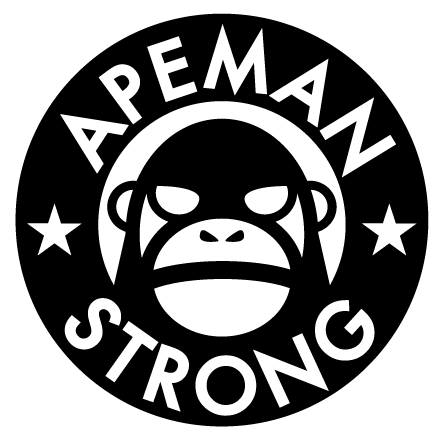Paul Sharp
At APEMAN, we believe that strong has many forms.
According to Paul Sharp, he was never the stereotypical definition of “strong.”
“I was the tall skinny kid in grade school all the way through my undergraduate degree program,” Paul said. “To make matters worse for me, in about 5th or 6th grade I started to develop a hunched back. Formally known as Scheuremann’s disease, this caused a severe kyphosis or curvature of my thoracic spine. To correct this, my physician decided it would be best to place me in a clam shell brace to influence my spine to grow straight as I hit puberty. I was to wear this brace 16 hours a day, or all through the waking hours only taking it off for showers and sleeping. Now not only was I the tall skinny kid, I was the tall skinny kid with a weird brace that could be seen under his shirt.”
The relentless bullying and harassment Paul subsequently endured intensified after he started wearing his brace. Being beat up in the halls of junior high school was a normal thing, and he became very depressed and introverted.
“In 9th grade it became apparent that the brace was not working and the physicians decided the only way to correct my curvature and prevent further health problems as I aged was to surgically correct my hunch back,” he said. “In the summer between junior high and high school, I went into the hospital for major back surgery. They fused my spine and placed two rods to hold everything in place until the fusion healed. I spent one week in the hospital and of that week three days were in the ICU. I had many amazing and painful experiences in the hospital. I was exposed to extreme pain, but also to very strong male nurses that were very caring and influential. It was because of their example that I pursued my profession as a cardiac ICU nurse and now as a nurse practitioner student. That experience shaped me for my life in many good ways.”
At the end of his surgery, he was told that he would never play any contact sports, never do any extreme sports or activities, and never be able to lift more than approximately half of my bodyweight. The best he could hope for in physical activity after the surgery was maybe running distance track or cross country.
As his life went on, Paul started working as an ICU nurse. Unfortunately, he had several influential experiences that nearly broke him from an emotional standpoint. He was soon diagnosed with major depressive disorder, general anxiety disorder and post-traumatic stress disorder.
“At the lowest point, I was suicidal, having a hard time getting out of bed, my performance at work plummeted, and I was in danger of being kicked out of my graduate program,” Paul said. “My wife, not really knowing the extent of my depression, helped me find an amazing therapist and I was placed on depression and anxiety medications. I got better… sort of. I could function. But I had lost all of my ambition, all of my drive, all of my passion for my work, and lived life in a haze.”
After about a year of being in a medicated haze, his brother helped Paul find the gym. He started lifting weights, being more active, and getting stronger. It was at about this time that he discovered powerlifting.
“I had a friend, a damn beast of a man, who was competing in powerlifting at or near elite levels,” Paul said. “He taught a powerlifting class at a local CrossFit box and I decided to give it a go thinking that his assistance could help me avoid injury. As this happened I started to progress and get a lot stronger. Soon I was lifting well over my bodyweight in the squat and deadlift! I got off my depression medications. My anxiety disappeared. My PTSD calmed down. At the same time my school performance improved. My work performance improved. My home life got better. Last year at about this time I made the remark to my buddy who was informally coaching me that I wanted to enter a powerlifting competition to make myself more accountable to my goals. He was more than encouraging! He took me on as a full athlete and started coaching me formally. I completed my first powerlifting competition in December of 2017.”
Paul may never lift “record” weight. But that’s alright. He knows what it is to fight through hell and battle back from the edge. He’s stronger than anyone thought possible.
“APEMAN resonates with me because of the messages you inspire,” Paul said. “APEMAN isn’t about wrecking shit and being jerks about it. Your company is about lifting others up through their hard times, becoming stronger. Together we can inspire each other to use the things that we are told would hold us back but actually fuel our rage and improvement. It is because of my trials that I am able to be who I am now.”
